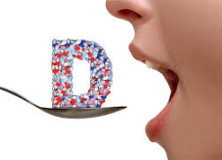
Low vitamin D has been associated in past studies with neurovascular injury (damage to the major blood vessels supplying the brain, brainstem, and upper spinal cord). Nils Henninger, from University of Massachusetts Medical School (Massachusetts, USA), and colleagues studied 96 stroke patients, assessing their blood levels of 25-hydroxyvitamin D (a marker of vitamin D status). Stroke patients who had low vitamin D levels less than 30 ng/mL) showed two-times larger areas of dead tissue resulting from obstruction of the blood supply compared to patients with normal vitamin D levels. Further, for each 10 ng/mL reduction in vitamin D level, the chance for healthy recovery in the three months following stroke decreased by almost half, regardless of the patient’s age or initial stroke severity.
Muhib A Khan, Jiaying Zhang, Majaz Moonis, Richard Goddeau, Nils Henninger, et al. “Predictors of Outcome in Patients With Acute M2 Occlusion” [Abstract #W P107]. Presented at American Stroke Association’s International Stroke Conference 2015, 5 Feb. 2015.


